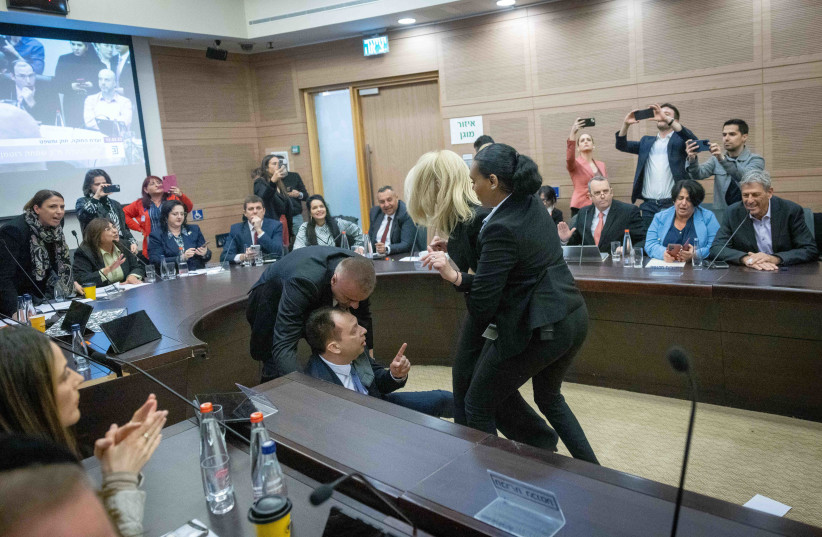Honor is defined as a sentiment borne of prestige and respect from others; it is an acknowledgment of the value of other persons. There are those who define one’s honor for others as the degree to which one respects oneself. Over and above the law, which provides the framework and the rules of the game which are customary in a particular society, and by which every citizen must abide or be punished, honor and mutual respect is the very glue that makes the day-to-day interaction between people pleasant rather than simply correct and lawful.
Law enforcement agencies in the State of Israel have undergone a steady and sad process of decline over time. Particularly in the past six months, the state of crime and violence, especially in the Arab Israeli street, has reached unprecedented heights. This has not been sudden or unexpected. Rather, it is the outcome of a years-long, systematic weakening of the police, via a continuous shortage of funding for it, a constant erosion of the status and standing of policemen in the public eye, as well as the complete lack of strategic planning in the field of well-trained manpower.
Those are but a few of the reasons for what seems to be the disintegration of the central and most important law enforcement mechanism in the country – the national police force. This long process of disintegration has received a seemingly fatal hit when six months ago, Itamar Ben-Gvir, who until recently was himself a target for the Israeli police, was appointed to head the National Security Ministry.
Hence, with a growing weakness in the only mechanism that has the legal authority to enforce the law within the country, Israeli citizens witness years of unruly and wild driving on the roads. Only a small portion of those drivers are caught and punished for their behavior.
Public officials such as bankers, post office clerks, Interior Ministry clerks charged with issuing passports, bus drivers etc, are all too often the victims of disrespectful, violent, and improper treatment by angry customers. It almost seems, at times, that this phenomenon has become the new norm owing to the lack of law enforcement agents, officers and staffers who could mitigate, deal with – and /or punish such behavior.

In a similar manner, polygamy is still widely practiced, especially amidst the Bedouin population in the south of the country, despite being completely outlawed by Israeli law. Extortion has become hugely prevalent amidst almost all small and medium-sized businesses throughout the country, and there is hardly a household in the Arab sector which does not hide illegal weapons whether for crime or for self-defense, given the completely insane level of crime that is the day-to-day reality in most Arab villages in the country.
Israel's institutions lack any culture of respect or discipline
THE KNESSET, which should serve as a beacon of cultural dignity representing the pluralistic Israeli society, is indeed hugely pluralistic, yet anything but a beacon of cultural dignity: Israeli youth may watch the uncouth and aggressive behavior of far too many Knesset members on the official Knesset channel and mistakenly adopt this as an exemplary behavior to follow. In this framework, often he who shouts louder is perceived as the victor.
The educational system has been infiltrated with much of the same lack of respect, a distinct and disturbing lack of discipline and unclear boundaries. Verbal and sometimes physical violence and disrespect for one’s teachers has become a norm, while educators are more often than not simply not backed up by the government, the law, society in general and parents in particular. A similar situation faces the medical teams in different hospitals throughout the country.
How can a society function, not to mention flourish, without this very basic ingredient of common respect to one’s fellow man, regardless of one’s political views, status, religion, gender, sexual orientation and connections? The answer is simple. It cannot.
We have no choice but to face a sorrowful truth – there is a lack of respect in Israeli society. The legal framework is not sufficient to maintain and enforce it even if it were perfect, which it certainly is not, given the current turmoil in the internal political arena. The judicial system is certainly insufficient in curbing it, even if were devoid of faults, which it certainly is not. It is overloaded, with far too few judges, huge delays and often an overly forgiving attitude towards criminals.
Much has been written by many, including myself, about potential remedies for the lack of law enforcement and the poor state of internal security in Israel in recent years. Undoubtedly, the government and the legislature are responsible for the legislation and implementation of much-sought-after solutions for these key issues. Given the current tumultuous situation in the Israeli political arena, empathy and mutual respect must take a more prominent role among the public.
They exist in abundance among many in Israel. Many Israelis are, indeed, role models of selflessness and giving, generosity and kindness, yet their voices and impact do not succeed in rising above those who lack these virtues. The latter simply yell louder…
It is the responsibility of each and every one of us to enhance and hail mutual respect and courtesy, not as a weakness but as a heroic strength. I have little doubt that just a little respect from many will go a very long way.
The writer is the founder and the CEO of Ruth-Strategic Consulting, a former MK for the National Unity Party, a former deputy ambassador to Cairo and a past adviser to president Shimon Peres.
